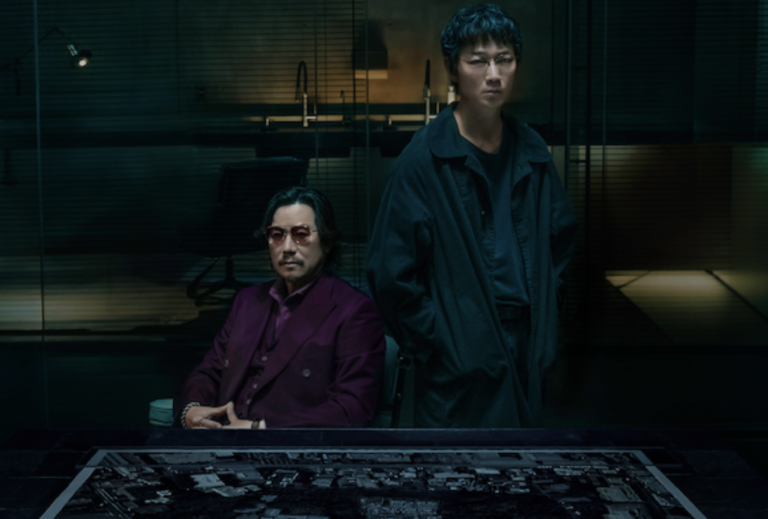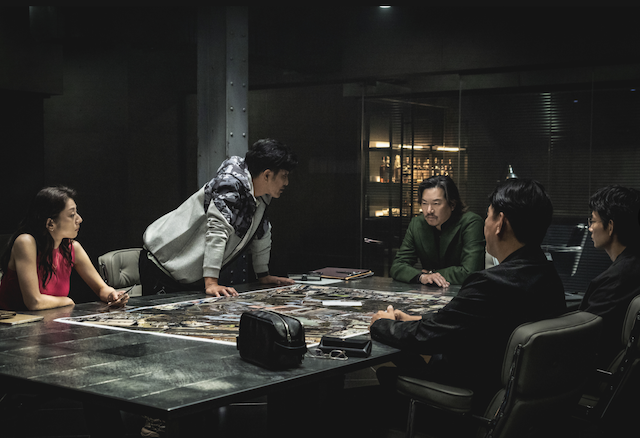
©Courtesy of Netflix
Based on a novel by Japanese author Ko Shimjo, and directed by Hitoshi Ône, the new Netflix series Tokyo Swindlers explores the cutthroat world of land swindlers who operate below the radar in the Japanese capital. With an aim of acquiring valuable properties by deceptive means, the greedy crews go to extreme lengths to accomplish their goals, including the recruiting and coaching of imposters who pretend to own prime parcels of real estate in Tokyo.
Seven episodes have thus far been released in the Tokyo Swindlers franchise. In the first episode, an elderly man in the throes of senility is given bogus ID and coached to pretend he is Kenichi Shimazaki, a property owner who fraudulently sells a piece of prime real estate worth billions of yen, much to the chagrin of the buyer, who has a hysterical breakdown when he realizes that his company’s hard-earned money has been stolen via a money-laundering scheme.
Buoyed by their success, the swindlers next attempt an even more elaborate deception in order to acquire a temple owned by a reclusive nun who comes under the surveillance of the fraudsters who track her movements with a telescope trained on her property.
 ©Courtesy of Netflix
©Courtesy of Netflix
Without exception, the players are portrayed as brilliant though warped strategists who do their homework assiduously, setting up an elaborate infrastructure to achieve their ends. Viewers are given a glimpse into their well-organized hierarchy that includes negotiators and legal experts, financial professionals, and even imposter recruiters tasked with creating phony but plausible identities for the scammers. While Tokyo Swindlers certainly has its share of violence and mayhem, the series is notable for the remarkable way it focuses its lens on some of the psychological issues that drive its protagonists into concocting their elaborate land-grabbing schemes.
This is especially evident in the case of Takumi Tsujimoto, played by Gô Ayano. Recurring scenes of a home engulfed in flames foreshadow revelations in the third episode that Tsujimoto’s mother had perished in an arson fire lit by her husband after the elderly man had been swindled out of his savings. A reviewer in meaww.com suggested that young Takumi’s “choice to become a swindler and start duping others could be seen as a coping mechanism, an attempt to take revenge on a world that he feels has wronged him, or even as a way to survive and assert his worth in a world where he felt powerless.”
Also notable are performances by Etsushi Toyokawa and Eiko Koike. Toyokawa plays the chief swindler Harrison Yamanaka with just the right combination of charm and cupidity. Koike is likewise brilliant in her role as the no-nonsense headhunter tasked with screening candidates for the imposter roles.
Some of the fraudulent transactions depicted in this riveting series are based on real-life experiences. In November, a Tokyo district court ordered 71-year-old Mike Uchida and four of his accomplices to pay a billion yen to an Osaka-based home builder who had been defrauded in a 2017 incident in which impersonators were used to steal a prime piece of real estate Uchida is now serving a 12-year prison sentence for having created a false signature seal by the landowner.
Overall, Tokyo Swindlers is a well-wrought series that is worth watching not only for its thoughtful analysis of the motivations behind the land-grab schemes but also for the insights it provides into the flaws of its all-too-human protagonists.

©Courtesy of Netflix
Rating: A
Check out other more of Edward Moran’s articles.
Here’s the trailer of the series.

